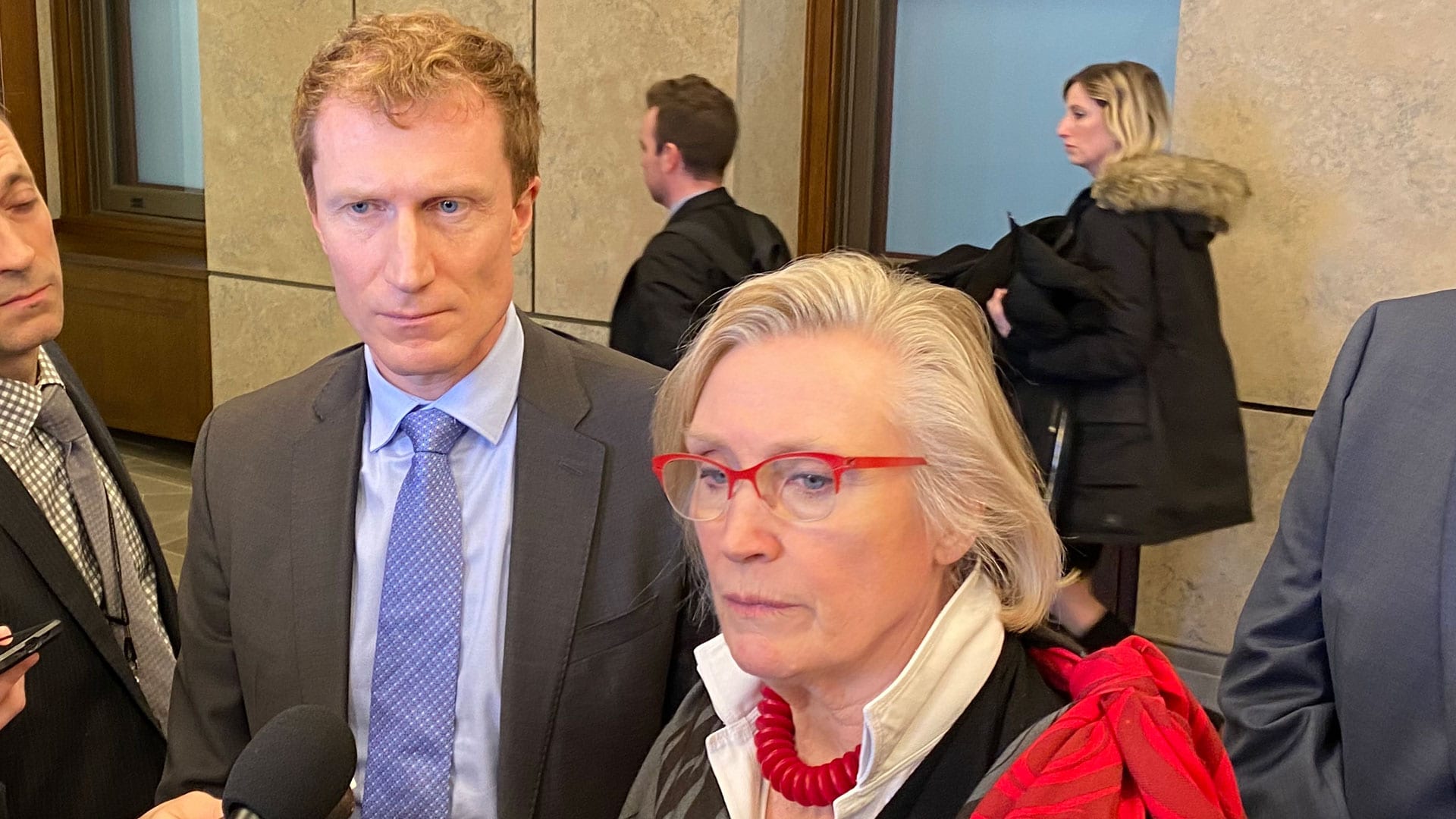
The Hiawatha belt flag of the Six Nations flying on Argyle Street in Caledonia. Photo: APTN
The elected council of the Six Nations of the Grand River says competing factions within the territory need to come together and present a unified front to finally resolve the community’s long-standing land claims with the federal and provincial governments.
This follows the traditional Haudenosaunee Confederacy chiefs’ call on April 20 for a moratorium on development across the entire Haldimand Tract in southern Ontario.
Asked at a virtual press conference if he supports the moratorium, elected Chief Mark Hill appeared to answer in the affirmative.
“We reiterate and acknowledge their call for the moratorium,” Hill told reporters. “We also need to keep in mind that we have a major land claims case coming before the courts in 2022, and it would not be responsible to allow continued development in an uncertain legal environment.”
The Confederacy chiefs said no development could proceed without the full consent of the Haudenosaunee people. They said builders looking to move projects ahead would have to go through the traditional chiefs’ development wing, the Haudenosaunee Development Institute (HDI).
Hill wouldn’t say if he supports this, saying instead that the process still needs to be hashed out.

“We need to make sure that the people are a part of that process and what that looks like. We need to all be held accountable for our actions and, again, be accountable to our people,” said Hill. “Those are part of the tough discussions that we need to have together and as a community.”
Nevertheless, Hill said he’s optimistic and encouraged following talks with the Confederacy.
The issues are pressing as the occupation of the McKenzie Meadows construction site in Caledonia has surpassed nine months and prevented over 200 homes from being built.
The camp, known as 1492 Land Back Lane, is connected to by a dirt path to the site of the contentious 2006 occupation of the Douglas Creek Estates. The site is known now to Six Nations people as Kanonhstaton.
The two standoffs are also connected by the land rights issues at the heart of the protests, which have not been addressed in the intervening 15 years.
In 2019, the elected council signed a “definitive agreement” with the builder Foxgate Developments outlining its support for the project.
Council agreed to support the project publicly, not to protest it and to support Foxgate in any litigation that may arise.
Read More:
Haudenosaunee chiefs declare development moratorium across entire Haldimand Tract
Six Nations elected council addresses controversial agreement with developer, condemns injunctions
The project’s 25-acre phase one was approved originally in 2003 when a different builder owned the property. But the developer put the plan on ice in 2006 when the protests broke out.
They dusted the project off in 2013 and filed for an “anticipatory injunction” against the elected council, traditional chiefs, HDI and all community members “in order to prevent any protests or work stoppages” at the site, according to court filings.
But the injunction was never litigated and mediation ensued. As a result, consultation took place in 2013 to gauge community support for the plan as well as a previous version of the proposed accommodation deal.
The plan would have diverted $1,250 from every residential unit sold towards the construction of a language school called Kawenni:io (or Gaweni:yo).
Seventy-nine people participated and two thirds of them opposed the project. Many expressed their disagreement in clear terms.
“A developer should not be allowed to build on land that is under a land claim that is unsettled,” wrote one person.
Other comments struck a similar vein. The yes votes appreciated the new cash for the school. Elected council rejected the deal at the time.
However, they went ahead with the new deal in 2019, receiving $352,000 and 42 acres as an accommodation.
Court filings attributed to occupation spokesperson Skyler Williams claim “there has been no documentation provided of any form on consultation” for this deal.
Council acknowledged the decision to sign was a source of community discontent and promised to do better in a statement last fall.
In his prepared remarks, Hill brought up the language school and called on the Confederacy to work with the elected council to support it.
“Kawenni:io is in need of a real school building,” he said. “We invite the Confederacy chiefs and clan mothers to support the students that have not had a permanent home for language learning since they opened their doors more than three decades ago.”
Asked if the Confederacy was somehow obstructing construction of the school, Hill replied that they were not and said that barriers exist more around “tougher issues” like land.
Hill was also asked what the roadmap to unifying the territory’s competing factions might look like and what he thought about Ottawa’s reported stipulation that unity needs to be reached before the feds can get involved.

On Nation to Nation last week, Indigenous Services Minister Marc Miller said Ottawa has made “overtures” to the traditional groups but hasn’t been formally invited “because there are some issues to work out.”
He didn’t elaborate on what those issues are. The ministers offered to hold land talks with elected and traditional chiefs in an Aug. 19, 2020 letter.
“We do speak. We do communicate views,” Miller told host Todd Lamirande. “But so far, an official invitation from the Confederacy in Six Nations has not been extended — for a variety of reasons that we respect. When we are properly invited, Minister (Carolyn) Bennett and I will attend.”
He did not elaborate on those reasons either. Talks were struck in 2006 at the height of the conflict but sputtered in 2009.
In a recent court filing, Foxgate alleges Ottawa has been negligent by failing to resolve the land claims. The allegations haven’t been tested in court and no defence materials have been filed.
The suit claims Ontario chose to resolve the 2006 occupation in a “short sighted” manner that failed to protect private property rights.
Ontario bought the land from that developer, Henco, and put it in trust. This “emboldened” activists to continue blocking roads and occupying developments, the suit alleges.
Foxgate’s owners also claim the Crown’s alleged failures to confirm Foxgate has valid, unencumbered title led to the companies being perceived as selfish, greedy thieves who have “actively tried to steal land from the Indigenous people.”
Foxgate, the suit says, has followed all the regulations required by Ontario and has a Crown land grant from 1853 as proof of title.
They argue that even if the Six Nations lawsuit succeeds it would not impact private property landholders within the area under claim.
The Six Nations suit does not seek return of third-party owned land. The claim alleges the Crown “unlawfully dispossessed” the Six Nations of all their land, cash and resources.
They want that money and land accounted for.
“The government of Canada owes Six Nations, potentially, in the trillions of dollars in relation to our lands which is why again our teams have worked so diligently with our court case,” said Hill.
“We have to hold Canada and Ontario accountable. We have to get to the table, and we have to figure this out once and for all.”










